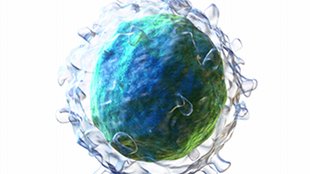 B cellWIKIMEDIA, BRUCEBLAUSRetroviral sequences in mammalian genomes are the remnants of old viral infections and, for the most part, their expression is suppressed. But a report published today (December 18) in Science suggests that, in B cells, a particular type of antigen can stimulate transcription of these viral relics, which in turn prompts cell proliferation and antibody production.
B cellWIKIMEDIA, BRUCEBLAUSRetroviral sequences in mammalian genomes are the remnants of old viral infections and, for the most part, their expression is suppressed. But a report published today (December 18) in Science suggests that, in B cells, a particular type of antigen can stimulate transcription of these viral relics, which in turn prompts cell proliferation and antibody production.
The work is a “tour de force,” said Michael Cancro, a professor of pathology and laboratory medicine at the University of Pennsylvania Perelman School of Medicine who was not involved in the study. “It may well be the seminal paper in resolving this long-standing conundrum of exactly what is a TI-2 antigen doing to get these B cells to kick off.”
TI-2 antigens are so named because they can stimulate B cells to produce antibodies in a T cell-independent (TI) manner. Unlike protein antigens—which need T helper cells to interact with and stimulate the B cell in which they are being processed—TI antigens can stimulate B cells on their own. TI-2 antigens tend to be large polysaccharides with repetitive structures, such as those that encapsulate ...



















